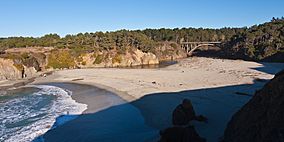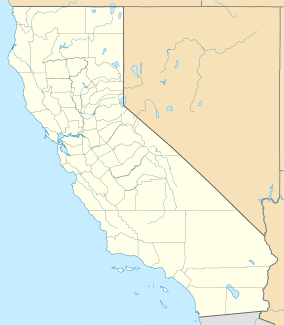Jug Handle State Natural Reserve facts for kids
Quick facts for kids Jug Handle State Natural Reserve |
|
|---|---|

Jug Handle Beach with visible headlands prairie, Sitka Spruce and Grand Fir krummholz, and stands of Bishop Pine
|
|
| Location | Mendocino County, California, USA |
| Nearest city | Fort Bragg, California |
| Area | 776 acres (314 ha) |
| Established | 1976 |
| Governing body | California Department of Parks and Recreation |
Jug Handle State Natural Reserve is a special park in California, USA. It protects unique land formations called marine terraces. These terraces show how different plant life grows over a very long time. The park is about 5 miles (8 km) from Mendocino and Fort Bragg. It is located right along California State Route 1. The park was created in 1976 and covers about 776 acres (314 ha).
Contents
The Ecological Staircase
Jug Handle State Natural Reserve is famous for its "Ecological Staircase." This staircase is made of five marine terraces along the Pacific coast. Imagine huge steps carved into the land by ocean waves over thousands of years! As the land slowly lifted up, new terraces formed. Each terrace has been above water for about 100,000 years longer than the one below it.
Because of this, each terrace has a different group of plants growing on it. It's like seeing 100,000 years of plant growth and change on each step!
- The lowest terrace, closest to the ocean, has a wide-open prairie.
- The second terrace is home to a redwood forest.
- The third terrace has a very special pygmy forest. Here, trees like cypresses and pines only grow 5 to 10 feet (1.5 to 3 m) tall. Shrubs like rhododendron and huckleberry are also very small. In 1969, this pygmy forest was named a National Natural Landmark.
You can explore these terraces on the Ecological Staircase trail. It's about 2.5 miles (4 km) long and goes from the coast to further inland. Experts say that few other places on Earth show such a clear example of how nature changes over time. While marine terraces exist along much of California's coast, they are usually hard to see. But at Jug Handle State Natural Reserve, they are very clear.
Bogs and Unique Plants
Along the upper part of Jug Handle Creek, you can find special wet areas called bogs. These bogs are home to mosses and interesting insect-eating plants called sundews. Sundews have sticky leaves that trap insects for food!
Park History
The park gets its name from Jug Handle Creek, which flows through it. The name "Jug Handle" comes from the shape of a bend in an old road that crossed the creek. Today, California State Route 1 crosses the creek on a large concrete bridge built in 1938.
Protecting the Land
In the 1960s, the Jug Handle area was in danger. There were plans to cut down trees and build homes and hotels. But many people wanted to protect this special place. A conservationist named John Olmsted worked hard with a soil expert, Hans Jenny, and local people. They fought to save the land between 1968 and 1972. Their efforts helped stop a company that wanted to build a motel overlooking the beach. This success helped make sure the park would be protected for everyone to enjoy.
Keeping the Park Open
In 2012, Jug Handle State Natural Reserve was one of many California state parks that faced closure due to money problems. But people who loved the park stepped up to help! Alden Olmsted, John Olmsted's son, led efforts to raise money. They placed donation buckets in local businesses. The community raised $9,500, and the California State Parks Foundation matched that amount. This money helped keep the park open for visitors.
 | Lonnie Johnson |
 | Granville Woods |
 | Lewis Howard Latimer |
 | James West |



